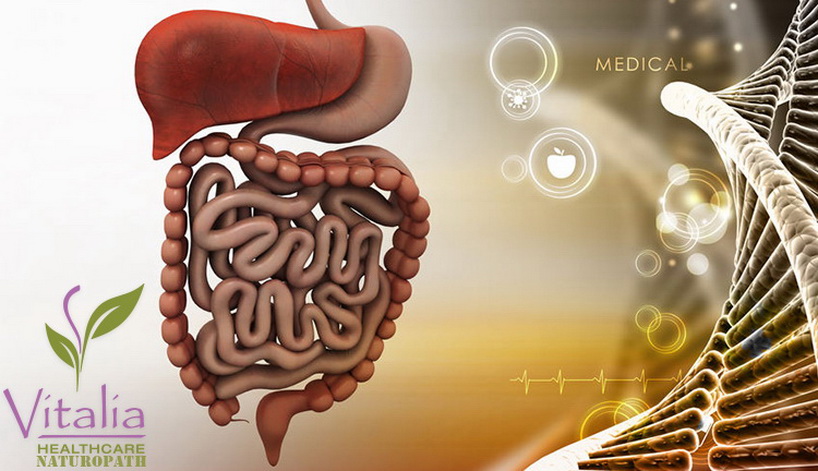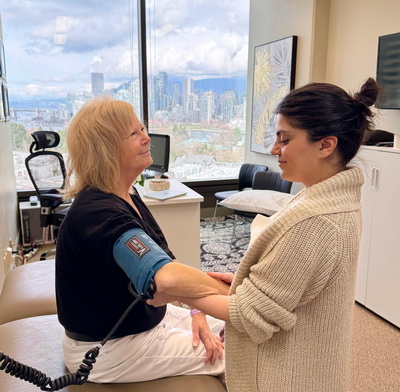

IBS Natural Treatment in Vancouver
Irritable bowel syndrome is a common gastrointestinal disorder affecting millions worldwide. It is characterized by abdominal cramps, bloating, gas and altered bowel habits such as constipation, diarrhea, or a combination of both. While the exact cause of IBS is unknown, it is thought to arise from a combination of factors, including gut motility issues, changes in gut microbiota, food sensitivities, and psychological factors.
Diagnosis
Naturopathic practitioners at Vitalia take a holistic approach to IBS management by conducting thorough evaluations to identify the underlying cause. This process may include a detailed medical history, a physical examination, and lab testing, such as a SIBO breath test, comprehensive stool analysis to assess gut microbiome health and food sensitivity tests.
Treatments for Irritable Bowel Syndrome
 IBS treastment at our Vancouver Clinic
IBS treastment at our Vancouver Clinic
Naturopathic treatments for IBS are personalized and tailored to the individual’s unique health needs. These often include lifestyle and dietary modifications, stress management, and personalized herbal remedies and supplements.
There is significant research surrounding the connection between the brain, gut and microbiota, and their role in IBS. The gut and brain communicate bidirectionally through the nervous system, hormones and immune pathways. When this connection is disrupted, digestion, mood and overall health can be adversely affected, leading to gut motility issues, local inflammation in the gut, and increased gut permeability. Supplements such as probiotics and prebiotics can help restore gut microbiota and demulcents such as marshmallow root can be used to address inflammation. Other supportive supplements and herbal remedies, like ginger or chamomile, can help manage symptoms of gas and bloating. Additionally, digestive enzymes and betaine HCL may be used to address low stomach acid production and malabsorption.
 Dr Farnoush Salimy
Dr Farnoush Salimy
Diet plays a significant role in shaping composition of the gut microbiota. Certain foods can promote healthy or harmful bacteria, influencing IBS symptoms. Depending on the underlying cause of IBS, naturopathic doctors may recommend temporarily eliminating common trigger foods. The low FODMAP diet, for example, can help identify high-fermentable foods that exacerbate IBS symptoms. Focusing on whole, unprocessed foods or adhering to an anti-inflammatory diet is often recommended to promote gut health and reduce inflammation.
Living with IBS can be challenging. Effective management often requires a comprehensive approach that includes dietary changes, appropriate supplements and a supportive framework provided by naturopathic medicine.
If you have any questions and would like to understand the underlying cause of your symptoms, book an appointment today with Dr. Farnoush Salimy, ND at Vitalia.

FAQ
Irritable bowel syndrome (IBS) is an intestinal disorder that causes a wide range of symptoms, such as abdominal cramps, gas, diarrhea, and constipation. Although treatment can help reduce symptoms, there is no cure for the condition. The common disorder directly affects the large intestine, but does not cause changes in the bowel tissue or increase your odds of developing colorectal cancer. Many people find that they can control their IBS symptoms by managing their stress, lifestyle and diet. By better understanding what causes irritable bowel syndrome, you can find better ways to relieve your discomfort.
The exact cause of IBS is not yet known. However, there are a number of factors that are believed to play a role in the development of the disorder. Abnormal muscle contractions in the intestines are believed to contribute to IBS. Intestinal contractions that are stronger and last longer than normal can result in bloating, gas, and diarrhea. Contractions that are weak can slow down the transfer of food leading to hard, dry stools. Abnormalities in the nerves of your digestive system can also result in abdominal discomfort when the stomach stretches from stool or gas.
Many people who experience IBS symptoms will also have inflammation in the intestines. These individuals are often found to have a higher number of immune- system cells in their intestines. In some instances, IBS can develop after a severe bout of gastroenteritis caused by a virus or bacteria. The condition has been linked to an overgrowth of bacteria in the intestines. There are also certain things that can trigger IBS symptoms, such as stress and hormonal changes. Food allergies and intolerances can also worsen symptoms, but are rarely known to cause IBS.
While some people with IBS require medication and counseling to reduce symptoms, most can manage with diet, lifestyle, and stress changes. The use of natural therapies can also be useful in managing symptoms. Intravenous glutathione therapy in Vancouver has been found helpful in aiding the immune system and reinforcing systemic detoxification. Glutathione is a type of antioxidant that is naturally produced by the liver, but can also be found in some fruits and veggies. However, glutathione delivered through an IV is often more effective than oral glutathione. This is because natural stomach acids and enzymes generally break down the antioxidant during oral use which renders it nearly useless.
Nutrition and dietary counseling can also be very useful when trying to manage your IBS symptoms. As many processed foods contain unknown ingredients that can trigger IBS flare-ups, it’s important to reevaluate what you eat and remove any foods or ingredients found to worsen your symptoms. With the help of a holistic nutritionist, you can better assess your dietary and lifestyle habits and find new and healthier ways to meet your nutritional goals. A holistic nutritionist can also provide invaluable education about how food can affect the body and impact your overall health.
Changes in nutrition and diet should not be a temporary treatment, but a lifelong management tool. Your holistic nutritionist can help you put together meal plans that are personalized to your tastes and health goals. You can also learn how to read food labels and avoid foods that may be harmful to your health. At-home visits can also be scheduled to help you properly set up and stock a kitchen with healthy staples. Finally, a holistic nutritionist can provide you with a plan that breaks down your goals into smaller and more manageable steps. To learn more about natural treatments for IBS, contact Vitalia Health Care in Vancouver.

